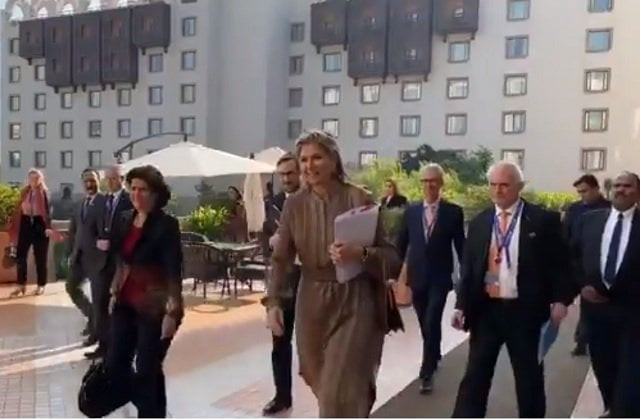Pakistan poised to boost tech enabled financial inclusion: Queen Maxima
Says country’s start-up tech and fintech ecosystems have made notable progress

Queen Máxima of the Netherlands in Islamabad. PHOTO: SCREENGRAB
In a meeting with State Bank of Pakistan (SBP) Governor Reza Baqir, she said in the last five years, the country’s start-up tech and fintech ecosystems had made some notable progress in relation to improving their supporting networks.
The special advocate and the governor discussed how inclusive financial technology (fintech) and digital finance represented a great opportunity to improve people’s financial lives while noting that it was important to consider and mitigate the risks associated with it.
She appreciated the progress made by the SBP and Pakistan with respect to financial inclusion while focusing on gender mainstreaming and digital financial services.
Queen Máxima of the Netherlands arrives in Pakistan
The queen said it could be helpful to establish a pro-poor gateway for the wider acceptance of micropayment methods and introduce consumers to micropayments on a large scale. She was supportive of the steps taken by the SBP for creating a micropayment gateway in 2020. She, however, added that while resolving the technical issues was important, it was more challenging to encourage people to engage in digital modes of payment.
The UNSGSA emphasised that in this regard the inclusion of new players was important, whereby they should not only be competing but also participating in expanding the delivery of services as well.
Earlier speaking on the occasion, Baqir highlighted the SBP’s initiatives, commitment and achievements in increasing financial inclusion under the National Financial Inclusion Strategy (NFIS) 2023. The governor said the SBP, being mindful of the rising gender gap in access to and use of financial services in Pakistan, had decided to launch a policy to reduce the gender gap in financial inclusion.
Accordingly, he presented a draft policy on gender mainstreaming to the UNSGSA, which was aimed at introducing a gender lens within the financial sector through identified pillars and specific measures. The central bank governor also highlighted that the SBP was exploring ways to encourage innovation in financial inclusion through fintech by creating an innovation office at the SBP.
Both the officials agreed to continue sharing ideas and follow up on the agreed tasks for promoting financial inclusion.
Queen Maxima also met with Adviser to the Prime Minister on Finance and Revenue Abdul Hafeez Shaikh on Tuesday to discuss the nature of public finance and the mechanism for resource distribution between the centre and provinces.
Queen Maxima lauds PM Imran's efforts for financial inclusion
Shaikh presented details of allocation of funds and resources for the protection of the poor and marginalised sections of the population, said a statement issued by the Ministry of Finance. The adviser gave the queen a detailed overview of the economic situation in Pakistan with focus on various policy steps and initiatives undertaken by the government to restore macroeconomic stability and make progress.
The queen shared her views on a range of economic issues, including the need for enhanced financial inclusion, better coordination among different tiers of the government, digitalisation in government departments, role of innovation and information technology in enhancing transparency and efficiency of the government and support to start-ups and new businesses.
(With additional input from APP)
Published in The Express Tribune, November 27th, 2019.
Like Business on Facebook, follow @TribuneBiz on Twitter to stay informed and join in the conversation.


















COMMENTS
Comments are moderated and generally will be posted if they are on-topic and not abusive.
For more information, please see our Comments FAQ